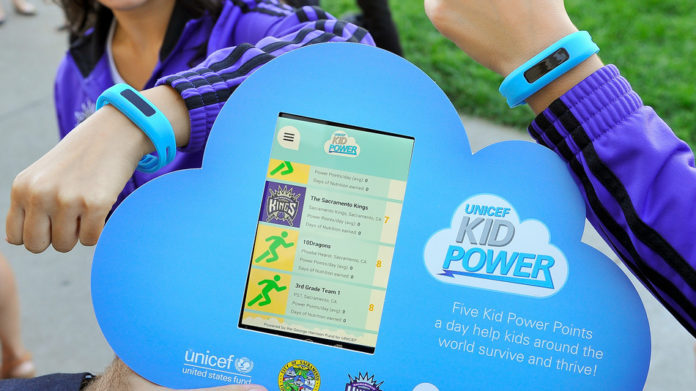Wearables for good: UNICEF Kid Power promotes fitness and saving lives

We use wearable technology for a number of reasons, whether it’s to keep fit, stay connected or learn more about ourselves. Now, UNICEF is tapping into the power of wearables for social good by debuting a new youth-focused initiative.
The UNICEF Kid Power program, which the U.S. Fund for UNICEF announced on Wednesday, encourages American elementary school students to stay active with a special fitness band. Each participant tracks his or her steps, racking up points that are then converted into life-saving nutrition packets for malnourished children in developing countries.
Approximately 10,000 kids in New York, Boston and Dallas will participate in the first initiative throughout the month of March, tracking their physical activity for 30 days, and learning more about healthy lifestyles and child malnutrition in class.
According to UNICEF, a full day of activity consists of 12,000 steps, or five Kid Power Points, which, through the program’s sponsors, will provide one package of Ready-to-Use Therapeutic Food (RUTF) for a child with severe acute malnutrition.

Students in Sacramento, California, try the UNICEF Kid Power fitness bands during a pilot program in October 2014.
Image: U.S. Fund for UNICEF/Steve Jennings/Getty Images
The initiative is backed by the three cities’ mayors, and players from local sports teams, such as the Boston Celtics, Boston Bruins and Dallas Mavericks, will encourage kids to stay active by visiting their classrooms and recognizing them at games.
“By putting children first, we believe we can reach a day when no child dies of a cause we know how to prevent,” U.S. Fund for UNICEF president and CEO Caryl M. Stern said in a press release. “I can’t think of a better motivator for kids to get active than the fact that they’re helping save lives.”
UNICEF tested the program in October 2014 with nearly 900 students and teachers across six schools in Sacramento, California. The pilot program’s results showed that those kids who participated were 55% more active than those who did not, and they earned enough points to feed 473 severely malnourished children.

Image: U.S. Fund for UNICEF/Steve Jennings/Getty Images
Educating kids about both healthy lifestyle choices and child malnutrition is more important now than ever. According to the U.S. Centers for Disease Control and Prevention, childhood obesity has more than doubled over the past 30 years, and as of 2012, more than one-third of American children and adolescents were overweight or obese. In contrast, almost half of all global deaths in children under the age of 5 are attributed to undernutrition, according to UNICEF.
“We have the tools and knowledge to save these lives; what’s lacking are the resources to reach every child with treatment. We want kids to be part of the solution,” Stern told Mashable.
UNICEF aims to expand Kid Power to additional U.S. cities this fall.
Have something to add to this story? Share it in the comments.
